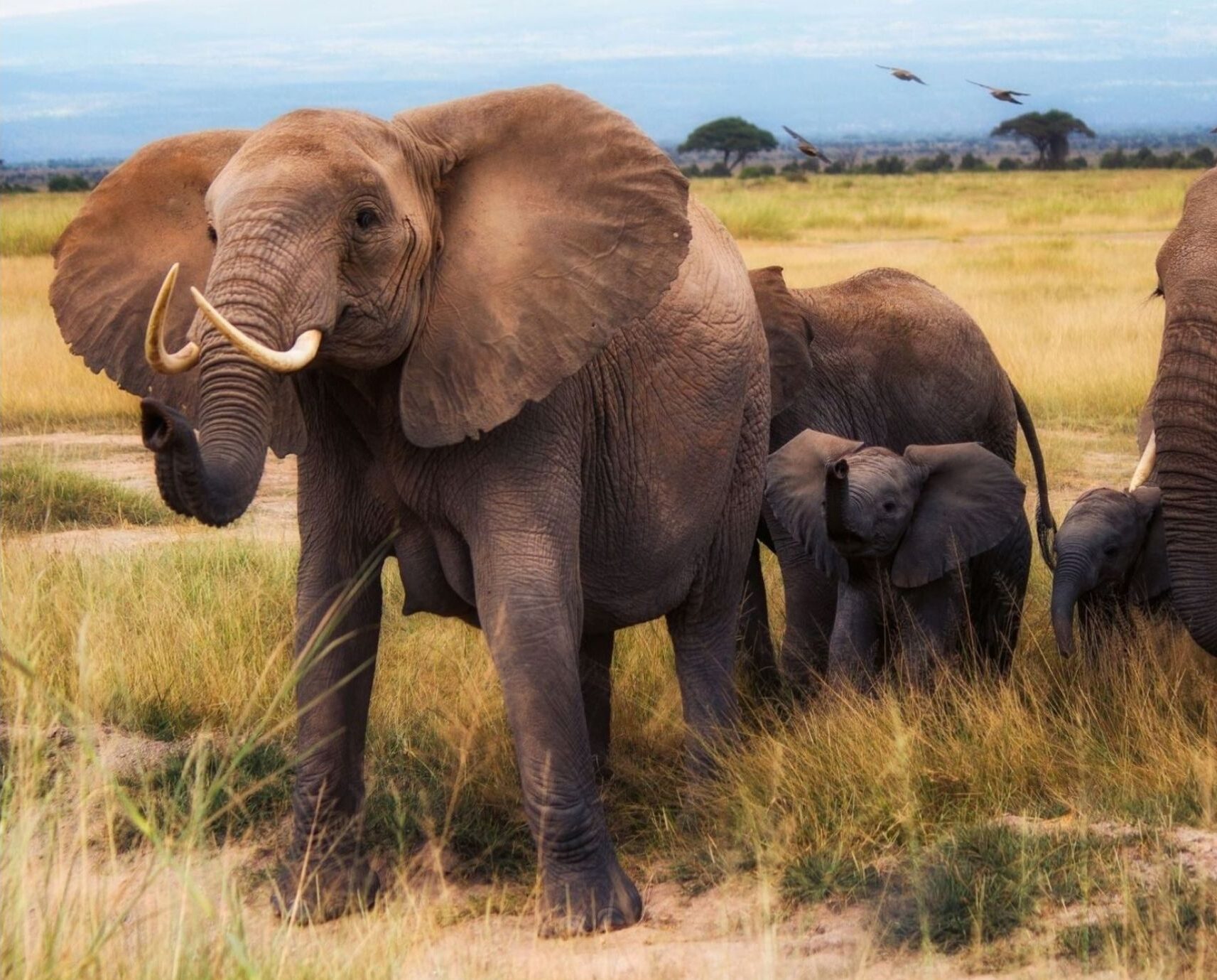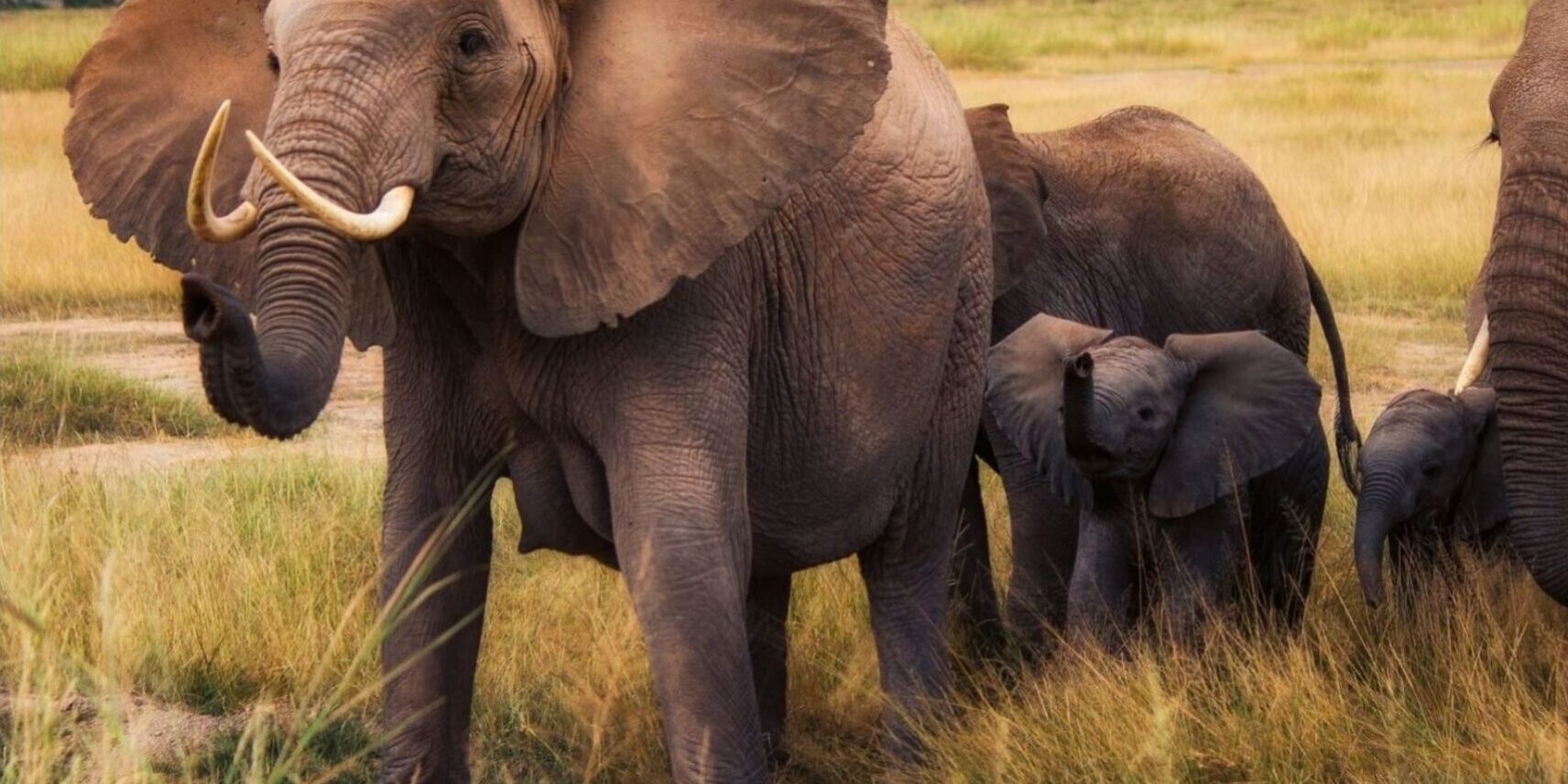A safari in Kenya
Anna, Kurt and I were on the way to Masai Mara to follow the mass migration of wildebeest. Kurt’s Landcruiser, packed with luggage, drove along the red-earth road and past the hillside shambas of the Rift Valley. Soon we were on some rough road, being jarred whenever the Landcruiser hit a large pothole. The drive was slow as the many potholes made it hard to cover good distance. Less than an hour out from Nairobi we got a puncture. Kurt and I quickly replaced the tire with a spare, and climbed back into the Landcruiser.
We stopped at a roadside duka at a dusty market town where I bought a bottle of warm Coke. Anna bought a pack of SM menthol cigarettes and a bottle of Kenya Cane, a cane spirit, as provisions for the safari. Next to the duka stood makeshift stalls selling trinkets including carved wooden giraffes, lions and hippos, and fake elephant-hair bracelets for gullible tourists. Sadly, the days of quality handicrafts, intricate ebony Makonde carvings, and exquisite beaded necklaces had been replaced by cheap trinkets from China. Refusing to buy into the ruse of inauthentic replicas, I bought a black mamba snake pickled in an old jam jar from a guy wearing flip-flops made from car tires.
An hour later, coming round a bend in the road, we pulled into the tented bush camp where we would spend a few nights. I stretched my cramped legs as I got out of the dirt-splattered Landcruiser, blinked in the sunlight, and hefted my bag out from the back. Kurt spoke in Swahili to a man standing in the parking lot. The man took some snuff from a tin he kept in his pocket, shook his head and made a clicking sound with his tongue as a subtle understanding of what had been agreed upon, and then led us to some green canvas tents.
After we had settled in, we went to the bar to relax with a cold beer. On the walls of the dimly lit room hung chimpanzee skulls, mounted antelope horns and bleached bones. Under this macabre setting, a man with elongated earlobes served us beer from a small camping fridge. By the bar was a dusty crate of Tusker empties. The fridge didn’t work well and the beer was warm, so Kurt put ice cubes in his glass.
In the late afternoon, we went for a game drive. There was a feeling of freedom driving in the open grasslands. As we drove along the savannah, the wide horizon and vast plains made for an expansive feeling, an overwhelming sense of awe. Giraffes craned their necks, browsing on acacia leaves in the treetops.
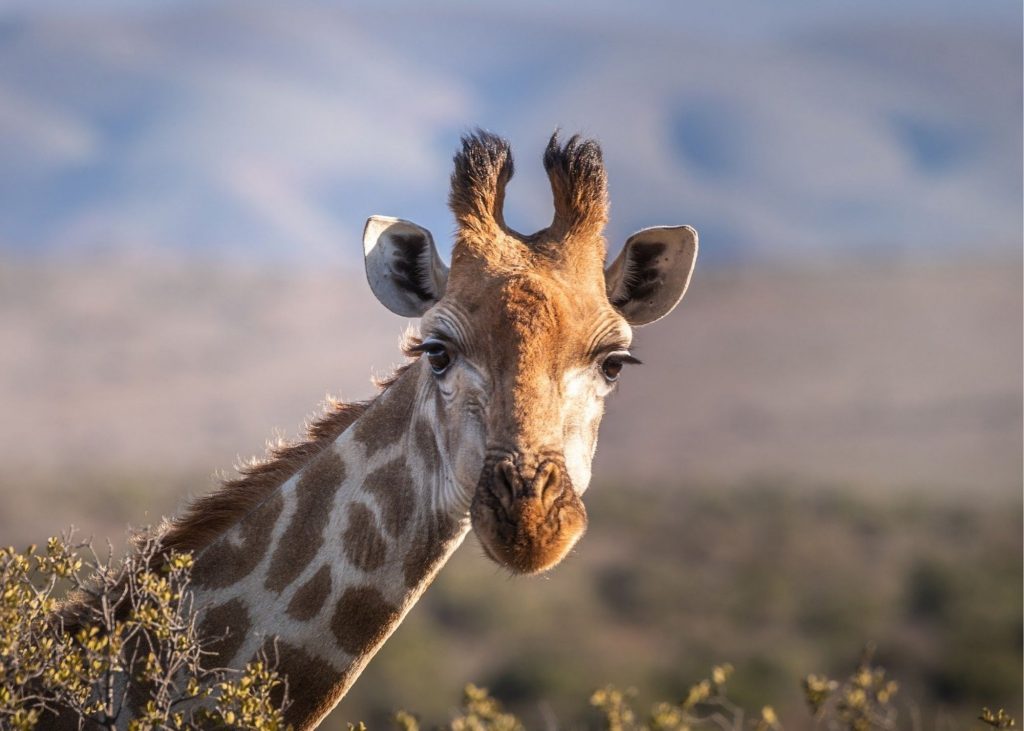
I stood in the roof opening and watched grazing Thompson gazelles clustered in a small herd on the short grass of the plains. When the wind shifted, trembling the leaves, they took off in bounding leaps as if they had a scent of imminent threat. The mud-streaked Landcruiser ventured deeper into the bush, driving toward a herd of zebra. A lioness lounged in the shade of an acacia tree, her frisky cubs rough-playing, snapping and growling, tumbling over each other. Cloud shadows drifted slowly across the plains. The sky paled as the fading sun disappeared behind the hills. In the last of the sunlight, acacia trees loomed in ominous silence against the bright, orange horizon.
Soon after dark we came into camp. We headed to the mess hut for a supper of impala steak and potatoes. The night breeze amplified the flames of the hurricane lamp on the dining table as we ate the meal accompanied by the chatter of baboons and the barking calls of hyenas in the darkness.
After dinner we drew up some camp chairs around a fire and talked late into the night. I remembered seeing a sign over the bar that read, Please, don’t give alcohol to the baboons. I asked Kurt which baboons the sign was alluding to. Kurt laughed and explained that drunk, marauding baboons from the game park had been causing a nuisance in the camp. Like some inebriated humans, they were picking fights in the bar, stealing food and acting obnoxious.
Anna and Kurt told stories about their Kenya travels until it got late. Then Kurt stamped out the fire, poured a shovel of sand on it and we made for the tents. I zipped the tent closed, lay down on the cot and read by lantern light until I started drifting off and then extinguished the flame. Lying in the darkness, going over the day’s events, I listened to the eerie trill of night creatures.
As the first light pierced through the gauze window of the tent, I woke up. I put on a sweatshirt and jeans, laced up my boots and walked out into the cool of early morning. I filled the canvas sink with hot water. Kurt was heating water for the shower over the campfire. The camp shower consisted of a bucket of fire-heated water hung from a nearby tree and attached to a cord that when pulled, tipped the bucket and created a pleasant, warm shower. At the mess tent, I had a breakfast of bacon and eggs and drank some good Kenya coffee from a tin cup.
After breakfast, I sat in a canvas folding chair by the bush kitchen, smoking a cigarette and looking forward to the day ahead. Anna was writing in her safari diary at a table nearby. When everyone had finished eating we went out for a game drive. As the Landcruiser clattered along a dry river bed, we came across a scattered herd of elephants.
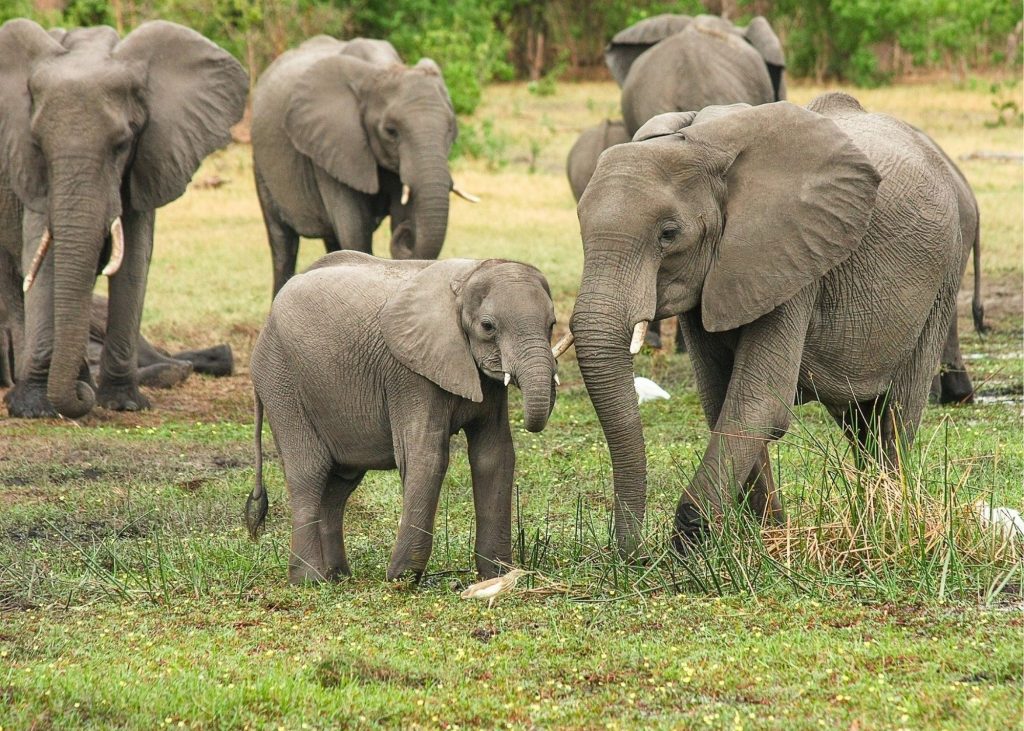
One of the baby elephants, flapping her ears, curled her trunk, like a serpent, around a branch and snapped it off. Beside her, the mother gave a contact call and approached another cow. They clicked tusks and entwined their trunks in greeting. Some elephants were gathering at a watering hole. A matriarch sucked water into her trunk, curled it back and sprayed the water over her creased hide. A calf ambled off with a loose floppy gait as her mother wallowed in the mud, resting her trunk over her tusk.
Heat waves shimmered across the plains as we drove toward the Mara river. Great herds of wildebeest were migrating, scattered across the savannah, as far as you could see. Several baby calves were lost outside the chaos of the stampede, bleating and looking for their mothers. The predators waited slyly on the sidelines to pounce on the weak or young. The herds soon amassed along the Mara River swollen from the rains. When they crossed where it was too deep, they were caught up in the strong currents, drowned from exhaustion or slashed at by the crocodiles. As the herds disappeared into the distance, after a long treacherous crossing, the river bank was littered with the remains of carcasses gorged on by vultures too bloated to fly. The entrails of the kill lay rotting in the sun.
Later that afternoon, after a short picnic lunch, we went for a drive along a bush track. After a bumpy ride over the plains, Kurt stopped the Landrover outside a Masai village and we got out. In the distance, I heard the bells of the cattle and saw tall, slim men walking a herd of cattle. They wore beaded belts and had red cloth shukas wrapped around their shoulders.
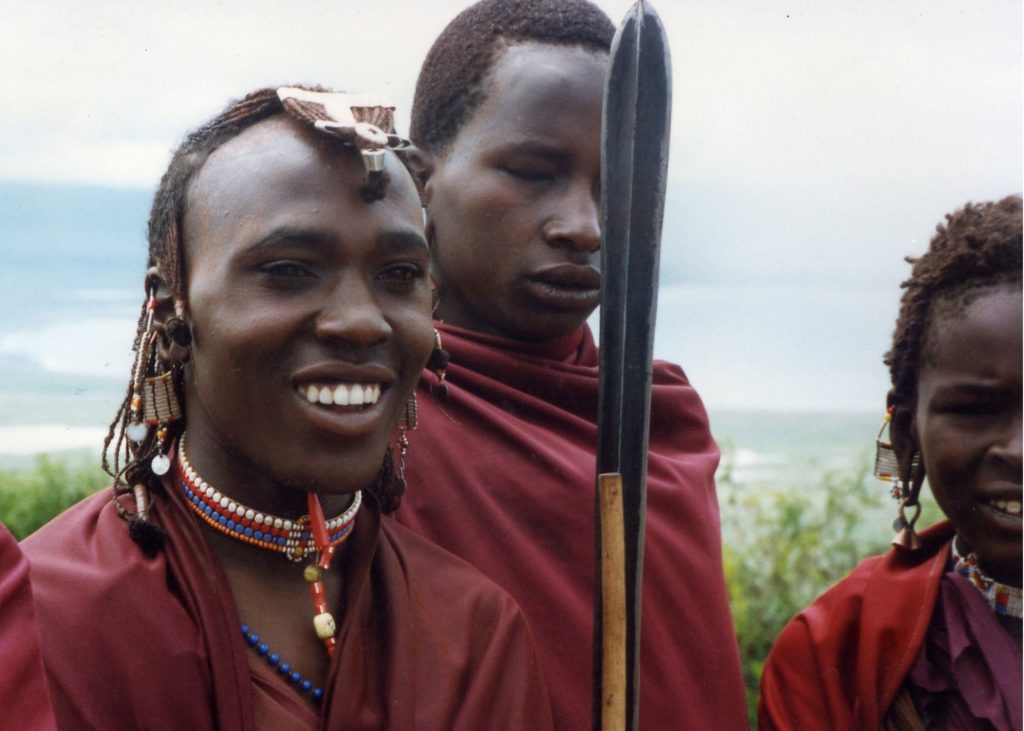
In a nearby patch of forest, a woman with stretched earlobes was collecting fallen branches for firewood. We continued along a dusty path through a thorn-bush fence to some dung huts. Kurt told me the cattle dung covering the huts made them more sturdy and water proof. A man with a body and face smeared with grease and red clay opened up the boma, a thorny acacia fence to keep lions from attacking their cattle. We were met by a tall, gaunt man wrapped in red cloth who spoke briefly to Kurt. A fee was negotiated for him to be our guide on a foot safari and we all set off.
We followed behind him, walking along a narrow game trail. He was carrying a lone blunt spear for staving off dangerous game and I was thinking, maybe we should have a more powerful weapon along.
“What if a lion attacks,” I said, “shouldn’t we have a more powerful weapon?”
Just then a buffalo broke through the thickets, stopping just short of our party and snorted in a face-off. I glanced nervously at the blunt spear and thought for sure we’d get charged by a disgruntled buffalo. To my surprise, the Masai had no need for a weapon. He stood his ground. After communicating with the buffalo through gestures and shouting, the powerful animal turned and retreated back into the thicket.
We continued on at a steady pace in spite of the tangled thorn scrub which the guide slashed at with his spear. We soon came upon a herd of zebra and antelope, but they scattered and trotted off at our approach. Way off across the plain a herd of elephants was foraging among the trees. Kurt stopped, scanned the country with binoculars and said he’d got a fix on a cheetah stalking some Thompson’s gazelle.
He handed me the binoculars. I made out the cheetah crouched down, singling out a lone gazelle that had strayed from the herd. Suddenly the cat sprang, accelerating to a fluid stride, its streamlined body turning quickly, zigzagging and gaining on its prey with a burst of speed. Reaching out with its forepaw, it clipped the ankle of the gazelle, tripping and knocking it off balance. As it toppled to the ground, the cheetah leaped at it. Ripping the flesh with sharp claws, the cat dug its powerful teeth into it’s throat. The kill was brutal, but awesome to see.
